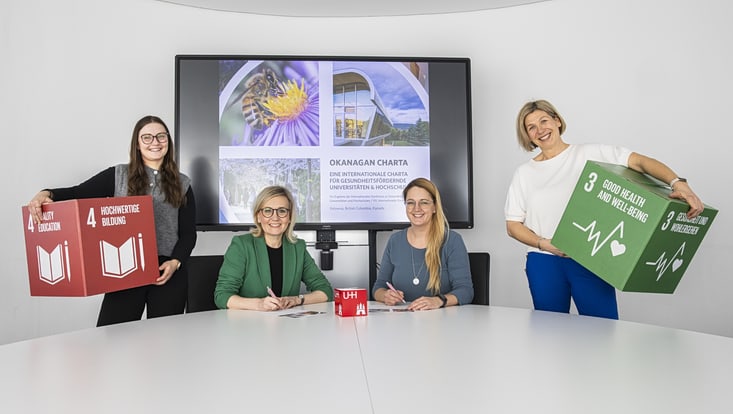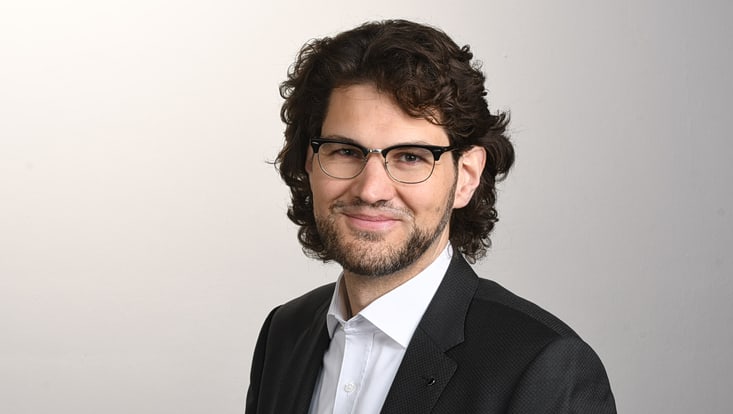Prominent alumnus in the Ernst Cassirer Lecture HallRobert Habeck Praises Research Project on 100 Years of University of Hamburg
1 July 2024, by Tim Schreiber
The publication of the fourth volume marks the conclusion of the largest research and publication project on the history of the University of Hamburg. In his speech, the economics minister and vice chancellor Dr. Robert Habeck expressed his awe at the undertaking and talked about his own past studying and doing his doctorate in Hamburg.
Robert Habeck vividly recalled his extensive work on Friedrich Holderlin’s poetry as well as the roar of the neon tubes in the Philturm’s library. He spent a lot of time there to complete to his master’s degree in 1996 and his subsequent doctoral work in German literature in 2000. After starting his studies in German literature and philosophy in Freiburg, he moved to Roskilde in Denmark and ultimately to Hamburg. At University of Hamburg, he found a good mix of German university tradition and Danish reform universities. Above all, he appreciated the students’ high degree of personal responsibility and notable independence.
Habeck admitted with a chuckle that he had not yet read all 4 volumes of the 300-page tome on University of Hamburg’s first 100 years, published by Rainer Nicolaysen, Eckart Krause, and Gunnar B. Zimmerman. He was nonetheless impressed by some of the highlights in historical review: in the 1990s, there were already papers in geography that are still current and very presciently showed how human-caused climate change was changing the conditions for life on Earth. He also pointed out how astounding it is that subjects like math were already being treated with political and social perspectives at University of Hamburg. “This kind of self-reflection and self-critique is impressive,” said Habeck. The entire work, he continued, also provides a valuable view of the complexity of the University.
“A perfect example of democracy”
Habeck said it is not simply a matter of course for a university to delve into its own history, especially not in this way—questioning its own research accomplishments and continuously reflecting upon its own role. Self-reflection and consideration of social realities make the project not only academically but societally relevant. “In times such as these, it is a perfect example of democracy,” said Habeck, who then expanded upon the larger social relevance: “Currently, society’s main problem is that we have countless microcosms that are becoming ever more rigid and self-regarding and thus they are losing the ability to take others into consideration. This is a trend in political parties, in governments, in nation states, between nation states, and between economies.” These volumes, he went on, exemplify how to buck such trends.
Before Habeck’s speech and the Q&A that followed, Prof. Dr. Rainer Nicolaysen, head of the Center for the History of Universität Hamburg and chief editor of the volumes, explained the concept of democratic university history writing and the significance of the Hamburg project, which included 135 authors from all areas of University of Hamburg. The 4 volumes contain 86 articles on 3,077 pages as well as 294 images and 9,670 footnotes. This makes it the largest research and publication project ever in University of Hamburg history. “Above all, we now know a lot more about the little-researched period after 1945—after all, three-fourths of its 100 years. Overall, the 4 volumes are a veritable treasure trove and solid basis for future studies,” said Nicolaysen.
In his opening speech, the University’s president, Prof. Dr. Hauke Heekeren, highlighted its many-sided approach, which addressed not only research and researchers but students and staff, as well: “The entire University, with its highs and lows and ambiguities, is on display.” The result is not just a self-regarding Festschrift of the kind that used to be so common but a scholarly work befitting a critical institution such as University of Hamburg, aware of its past and committed to an appropriate culture of remembrance.
Katharina Fegebank, Hamburg’s science senator, also praised the work as a “unique and exciting research project” that impressively showcases Hamburg’s spirit. Fegebank hearkened back to the very founding of the University, which had been preceded by a “long fight.” Over 100 years ago, she said, and in competition to businesses and the port, an historic and important decision was made for the entire city.








